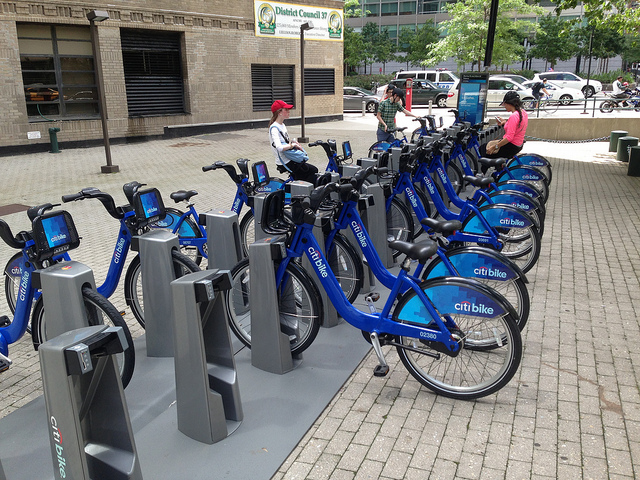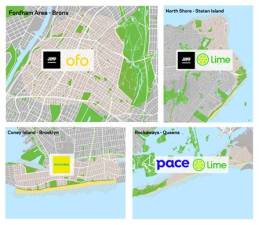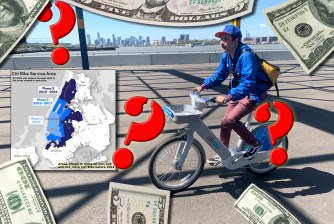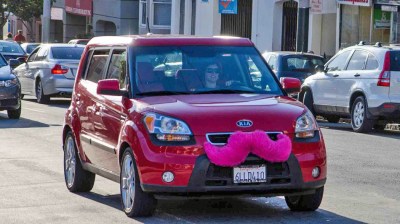What Happens When a Company That Sells Car Trips Gets Into the Bike Trip Business?
Lyft has acquired the nation's largest bike-share company, setting up a situation where its bike trip sales will cannibalize its car trip sales.

The rumors were on target. Lyft, Uber’s smaller but gigantic-in-its-own-right competitor in the ride-hailing business, has acquired Motivate, the company that runs several of the largest bike-share systems in America. The price isn’t public yet, but unconfirmed earlier reports pegged it at $250 million. The new entity is called “Lyft Bikes.”
Lyft gets Motivate’s “current engineering, technology, marketing, communications, legal and supply chain capabilities as well as some human resources and finance functions,” according to a spokesperson. The terms of Motivate’s contracts with local governments will not be affected, and those agreements — which grant varying degrees of exclusivity in New York, Chicago, San Francisco, and other large cities — are very valuable.
The transportation analysts I’ve spoken to are of two minds on the deal.
The optimistic take sees huge potential in the nation’s largest bike-share operator getting an infusion of capital. Motivate’s bicycles and its ability to run bike-share fleets are highly regarded (though Lyft is not acquiring “service operations and bike maintenance,” which will remain under a separate company retaining the Motivate name). While its systems work well and currently account for 80 percent of all bike-share trips in the U.S., Motivate’s momentum has petered out as dockless bike-share and scooter start-ups have entered the scene. Cities are taking a wait-and-see approach while changes in the bike-share market play out, and Motivate systems like Citi Bike are stagnating in the meantime.
The acquisition by Lyft could change this dynamic. Motivate has yet to show what it can do with the dockless and electric-assist bicycles it’s been developing. The announcement yesterday renews Motivate’s relevance, with Lyft explicitly mentioning “dockless and pedal-assist electric bikes” as the type of “innovation” it intends to expedite. You can also expect Lyft Bikes to start appearing in cities where Lyft already runs ride-hailing services.
But is Lyft going to maximize the potential of bike-share as a ubiquitous urban travel option for shorter trips?
The pessimistic take on the deal is that Lyft’s core business — selling car trips in cities — will put a ceiling on what it does as a bike-share company. Motivate was a company fighting and scrapping to sell people bike trips. Now it will be subsumed within a company “demonstrating how the biggest impact is realized when multiple modes come together into a cohesive system.”
It’s encouraging that Lyft reportedly acquired Motivate to fend off bike-share/scooter start-ups like Lime and Bird, as well as Uber, which recently made a play for relevance in the bike-share market by purchasing Jump. The more the ride-hail giants have to compete on terms dictated by bike and scooter companies, the better.
But Lyft’s bike-share offerings will also cannibalize its ride-hail business. As analyst Todd Schneider has shown, more than half of rush-hour taxi trips in Manhattan would be faster as Citi Bike trips. It would be wonderful for New York if bikes capture a large chunk of these trips from space-hogging cars that overrun the streets and slow everyone down. Would it be wonderful for Lyft?
I doubt that Lyft will enthusiastically try to convert its car trips to bike trips without some sort of prompt from policy makers. Bike-share is a very low-margin business. Generally speaking, regular bike-share users are spending a dollar or less on each trip. Lyft may be losing money in the brutally competitive ride-hailing business, but the easiest path to profitability still seems to be selling more car trips, or holding out until the foretold era of shared autonomous car fleets finally arrives.
It’s certainly possible to envision a company that serves the market for trips of a few miles or less mainly with bikes, and the market for longer point-to-point trips mainly with cars. That model would work well for cities. Whether it works well for Lyft and its investors remains unknown.
In all likelihood, Lyft and other companies are going to need at least a nudge in the right direction. Cities can’t sit by passively and relinquish their ability to shape transportation systems. They have to exercise their policy-making prerogative. Car trip businesses will work for cities if road pricing pushes ride-hailing trips away from congested city centers and toward areas where transit is sparser. Bike-share businesses will work for cities if car traffic is held in check and people feel safe riding bicycles on the street.




